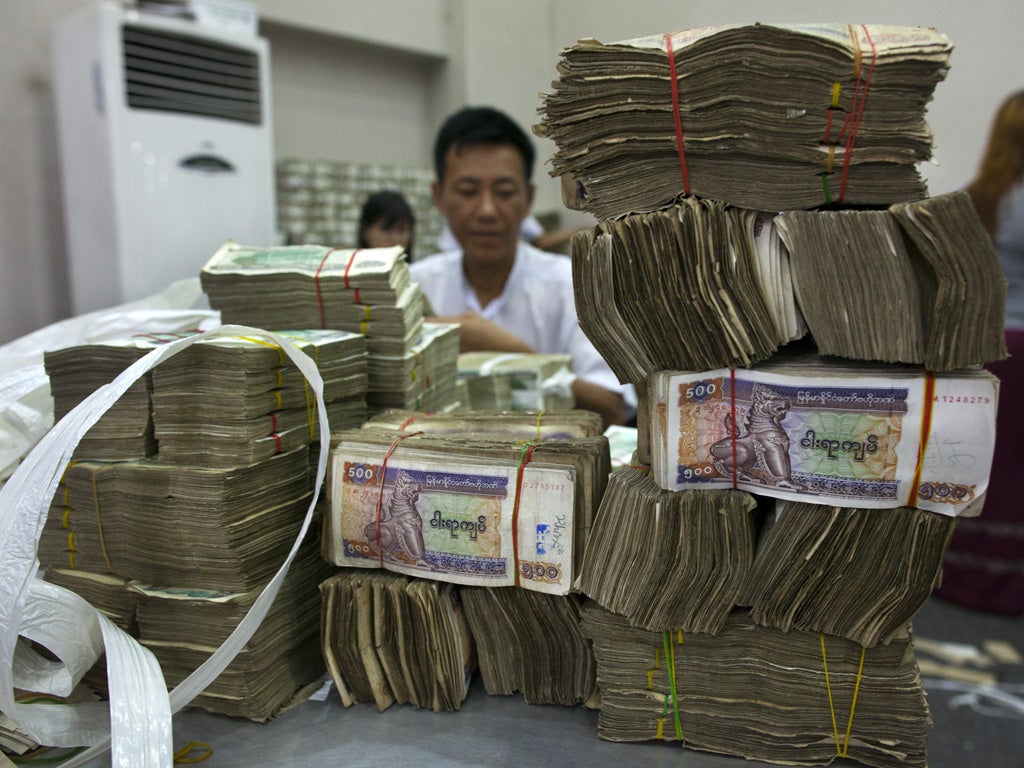UK firms in secret talks on joining Burmese gold rush
Rights groups uneasy over race to invest in nation with long record of broken promises of reform

British businesses are looking to invest once more in Burma, as Western multinationals prepare for a gold rush inside one of South-east Asia's least developed – and potentially lucrative – economies.
JCB, Shell, HSBC and Standard Chartered are among the British firms said to be interested in Burma's potential.
The Independent understands the Foreign Office has held meetings with some British companies that have expressed an interest in investing in Burma. Officially, UK Trade and Investment does not encourage British firms to do business in the country. But a number of key British businesses privately indicate they are considering investing in Burma if reforms are brought in and EU sanctions against the state are lifted.
Reformists within Burma, desperate to attract foreign investment after decades of international pariah status, have promised a host of economic and political measures that they hope will encourage the US and Europe to lift sanctions. Washington gave its first indication this week it would begin lifting some of the sanctions that have been placed on the regime. The EU will decide whether to do the same later this month.
Many of Burma's neighbours have already set up shop in the resource-rich nation, prompting fear among Western companies that Asian rivals are stealing a march. One business figure with intimate knowledge of the market said: "The Chinese, Singaporeans, Koreans and Japanese are flocking to Burma."
Human rights groups express fears that the international community risks being hoodwinked by false promises from a junta with a long track record of back-tracking and brutality. They point to the example of Libya's Colonel Gaddafi, who attracted enormous Western investment in his final years with promises of reform, only to respond with ferocious brutality against his own people when his rule was challenged.
Burma's leading pro-democracy politician Aung San Suu Kyi has, however, given cautious support to the lifting of sanctions. The International Monetary Fund recently called Burma the "next economic frontier in Asia".
Rajen Nair, the regional head for JCB, Britain's largest construction equipment manufacturer, told The Irrawaddy newspaper: "I think Burma has very good potential for growth in the coming years."
A Standard Chartered spokesman told The Independent: "We make 70 per cent of our income in Asia and Burma is one of the very few countries where we don't have a presence. We would look at any market where we are able to operate, but only open for business when it is safe and makes economic sense to do so."
A Shell spokesman said: "Shell is not currently involved in Burma, and is in full compliance with the requirements of various governments. We have an ongoing dialogue with a wide variety of stakeholders to better understand the current economic, political and business environment in the region." HSBC did not respond to requests for comment.
Overall The Independent polled more than 20 major British companies about whether they considered Burma had investment potential. Although few were willing to say so publicly, many indicated that – if and when sanctions were lifted – they would look to move in.
"There is a danger of a free-for-all as companies try to muscle into a market that has virtually no environmental or regulatory controls," said Mark Farmaner of the Burma Campaign. "Forced labour is widespread and despite recent reforms there are hundreds of political prisoners still languishing in prison."
Corruption remains a major issue with Transparency International rating Burma third-worst in the world after North Korea and Somalia. Outside major population centres such as Rangoon Generals rule their areas like personal fiefdoms.
Professor Sean Turnell of Sydney's Macquarie University, who specialises in Burma's economy, has just returned from the country. "The hotels are bristling with people from all over the world coming in with ideas for doing business," he said. "But most are still put off by the difficulty of doing business, the risky political climate and sheer lack of infrastructure."
Junta says Suu Kyi's party broke vote rules
Eighteen months ago there was international condemnation of intimidation and vote-rigging as Burma's military junta romped home in the first elections for a generation. Now, having been trounced at the polls, it is the junta which is claiming foul.
The Union Solidarity and Development Party, the army-backed party in Burma, has announced it is to lodge an official complaint about what it called "poll irregularities" by Aung San Suu Kyi's supporters.
In this year's by-elections, Ms Suu Kyi's opposition National League for Democracy won 43 of the 45 parliamentary seats that were contested, while the USDP won just one – the only one where the NLD hadn't put up a candidate.
The junta has complained that the NLD or its supporters breached election rules by activities such as campaigning too close to polling stations and casting fake votes.
In a further sign of possible political changes in Burma, leaders of the Karen National Union, which has been fighting for greater autonomy since 1948, have reopened ceasefire talks.
Lewis Smith
Join our commenting forum
Join thought-provoking conversations, follow other Independent readers and see their replies
Comments